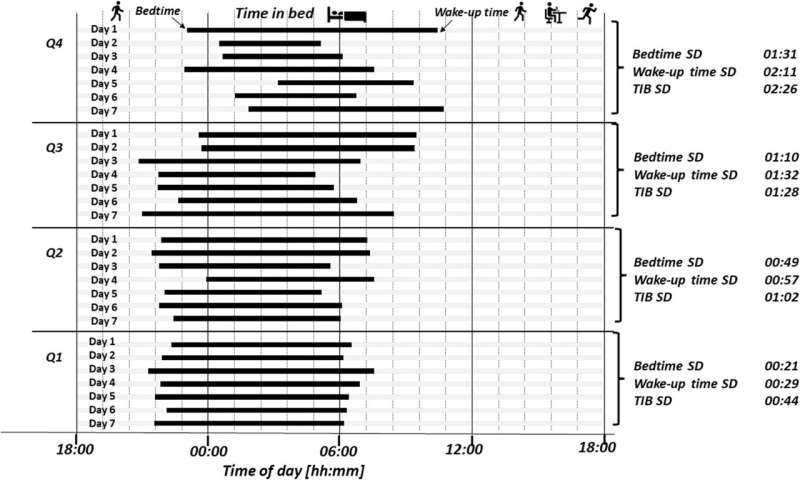This article has been reviewed according to Science X's editorial process and policies. Editors have highlighted the following attributes while ensuring the content's credibility:
fact-checked
trusted source
proofread
Research shows irregular sleep rhythm challenges the health of middle-aged people

According to recent research, an irregular sleep rhythm is associated with poorer cardiovascular health in middle-aged people. Inconsistent bedtimes appear to particularly increase waist circumference. The results are revealed in a joint study by the University of Oulu and Oulu Deaconess Institute Foundation sr., Department of Sports, and Exercise Medicine.
The paper, "Regularity of bedtime, wake-up time, and time in bed in midlife: associations with cardiometabolic health markers with adjustment for physical activity and sedentary time," is published in the Journal of Activity, Sedentary and Sleep Behaviors.
This is the first large-scale population study focusing on middle-aged people who used an activity monitor to measure physical activity and sleep rhythm. According to the results, physical activity reduced the harmful association between an irregular sleep rhythm and cardiovascular disease risk factors, such as blood sugar levels, triglyceride levels or blood pressure.
Regardless of the amount of physical activity and time spent in bed, irregular bedtime was associated with a larger waist circumference among the study participants. "The association was statistically significant, although the differences in waist circumference between those who go to bed regularly and those who go to bed irregularly were not very large," says lead researcher Laura Nauha.
The study used comprehensive research data collected from individuals born in 1966 in Northern Finland.
A total of nearly 3,700 participants took part in the follow-up study at the age of 46. They completed health and lifestyle questionnaires and participated in a clinical examination where measurements of body, blood pressure, blood lipid values, and oral glucose tolerance test were conducted. Physical activity and sleep rhythm were measured using an activity meter worn on the wrist.
On average, the middle-aged participants went to bed at 23.22, woke up at 7.17, and their average time in bed was 7h 57min. In half of the participants, bedtime, wake-up time and also the time spent in bed varied by at least one hour around the weekly average.
"It is assumed that the average time spent in bed by middle-aged people enables a sufficient and recommended length of night's sleep, i.e. seven to nine hours. However, it is worth noting that a greater variation in the sleep rhythm referred to a later average bedtime and wake-up time," Nauha reflects.
Previous population-based studies related to sleep rhythm and cardiovascular health have mainly focused on shift workers. However, factors other than work hours also impact the sleep rhythm.
"Since the functioning of a human's internal rhythm is physiologically based on approximately 24-hour cycles, in addition to the amount of sleep and physical activity, attention should be paid to the regularity of sleep rhythm from day to day. Individual's circadian rhythm, regularity of sleep rhythm and physical activity should be better considered in health counseling than at present," Nauha says.
More information: Laura Nauha et al, Regularity of bedtime, wake-up time, and time in bed in mid-life: associations with cardiometabolic health markers with adjustment for physical activity and sedentary time, Journal of Activity, Sedentary and Sleep Behaviors (2024). DOI: 10.1186/s44167-023-00040-6




















